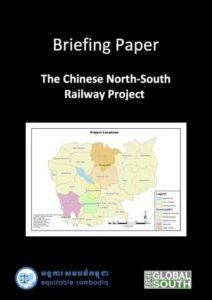05/03/2013
Under: Publications, The Commons
The companies will work to develop iron mines, build the country’s first steel plant in Preah Vihear province, and create a purpose-built seaport on Cambodia’s southern coast in Koh Kong province, all linked by 400 kilometres of railway connecting the steel plant to shipping facilities.
As currently planned, the project will be the biggest in Cambodia’s history. Because of its size and geographical coverage—north to the southwest and passing through some of the most sensitive regions of the country—the project is expected to have wide-raging impacts which need to be adequately assessed, understood and, if the project goes forward, addressed and mitigated. However, little information is currently available to the public regarding many aspects of the project, including the exact route of the railroad. The absence of adequate information limits the ability of the public, civil society, and other concerned observers, to engage in discussion on the potential benefits and risks of this project.
In an attempt to foster discussion among the government and the public—especially communities likely to be affected by the project—Equitable Cambodia and Focus on the Global South have prepared a briefing paper to provide an overview of the project. The paper presents public information compiled from available media reports, company websites, and other sources.
The paper also highlights areas where information is still lacking. Given the scale and potentially far-reaching impacts of the project, it is hoped that the Royal Government of Cambodia and the companies involved will make further information available in the near future, especially:
- Exact project locations for all components of the project;
- Economic justifications for the project including how much ore is recoverable in Rovieng and how much steel the project will produce;
- Information on when Environmental Impact Assessments will be conducted and how adequate public consultation will be ensured;
- Precise information on which people, communities and villages will be affected by all components of the project;
- Social and environmental safeguards that the companies involved will adhere to in the implementation of the project;
- Ownership of the Cambodia Iron & Steel Mining Industry Group;
- How the project is being financed;
- If the Chinese-built railroad would connect with Cambodia’s existing train system;
- If the Chinese-built railroad would link with either of the country’s two already established ports.
“We call on the Royal Government of Cambodia to disclose detailed information of the project and make sure that all affected people are meaningfully consulted,” said Eang Vuthy, Director of Equitable Cambodia. “All domestic and international regulations must be implemented to avoid the social and environmental impacts associated with the project.”
According to Shalmali Guttal from Focus on the Global South, “Given the massive scale and complexity of the project, we hope the Cambodian authorities will proceed with extreme caution, allowing for full, proper assessment of project costs and impacts, and safeguarding local livelihoods and environments.”






